Blockchain: A better way to trade?
Dozens of companies are using or experimenting with blockchain, a new technology that creates a digital ledger of transactions that can be shared across a network of computers. The banking industry has shown a keen interest in the technology. Moody’s Investors Service recently found that more than 120 projects are under way using blockchain.
Moody’s said it has the potentially to be useful to capital markets, trade, health care, energy and taxation. For example, blockchain could enable financial institutions and other businesses to securely transfer and record large payments without using transfer services or producing a lot of paperwork, both of which are often costly.
The potential payoffs, Moody’s said, include greater efficiency, speed, security and reliability at a lower cost. Advocates have placed potential savings in the billions of dollars.
Sharing data promotes accountability
Being able to share a digital ledger with financial or trading partners also eliminates the need for a central transfer authority. The technology creates a chain of blocks that are added chronologically as new transactions are posted. Critically, everyone can see the same information in real time, lending accountability to the system. While touting the potential benefits of the technology, Moody’s said widespread implementation is unlikely to happen soon. ”There is significant enthusiasm for the potential of the technology. But there is still a limited track record of large-scale blockchain implementation. Many hurdles lie ahead before we see widespread applications,” Robard Williams, Moody’s senior vice president said.
Financial community shows interest
The technology has prompted excitement in the financial community.
In August, two major banks, HSBC and Bank of America, and the financial technology company R3, announced that they had created a way to use blockchain technology to simplify their trade finance process. New York-based R3 formed a blockchain consortium last year and has more than 55 member banks so far. Working with R3, HSBC and Bank of America said they had created a letter of credit transaction with the Infocomm Development Authority of Singapore. Letters of credit are widely used to reduce risk to importers and exporters, but the current process is time consuming because it requires a long paper trail. R3 also said 15 other banks that are part of its consortium have designed agreements on its blockchain platform in order to process invoices and letters of credit.
Thomson Reuters joins group
Thomson Reuters has also joined the R3 consortium – the first major tech and data provider to do so. The company said it is working on how to use blockchain technology in global financial markets.
Mark Rodrigues, managing director at Thomson Reuters in New York noted that most of the financial institutions that are members of the consortium are Thomson Reuter clients. He said Thomson Reuters is particularly interested in exploring using the technology in its trade finance business, as well as in foreign exchange clearing and settlement. Thomson Reuters operates two currency-trading platforms, FXall and Thomson Reuters Matching, with a total daily average of foreign exchange trading of nearly $400 billion in June.
Links between cash and trades are “very imprecise right now,” said Rodrigues. “If we have data standards and distributed ledgers, you could eliminate a tremendous amount” of risk.
Thomson Reuters has been working with blockchain for more than a year, with labs in New York and London. In addition to trade transactions, the company is looking at the technology for its legal and tax business.
Shipper, auto maker use technology
Other sectors have also taken note of blockchain’s potential.
Marine Transport International, Ltd., a freight shipper based in the United Kingdom, said in September it had begun using blockchain technology to track shipping data and share it with port officials, cargo owners and others in its global supply chain. The company, which made its first public blockchain transaction on Sept. 1, is one of only a few companies outside of the financial sector to use blockchain for core operations.
Toyota will test using the technology to track financial transactions, according to Chris Ballinger, head of strategic innovation at Toyota Financial Services. Toyota recently joined the R3 consortium. In the future, the auto maker might be able to use blockchain to track automobile parts and play a role in enabling connected cars to link to drivers’ personal devices and censors on infrastructure, Ballenger said. “That’s fairly far out and extremely speculative,” he said, “But it’s important to get your toe in the water.”
















There are no comments
Add yours